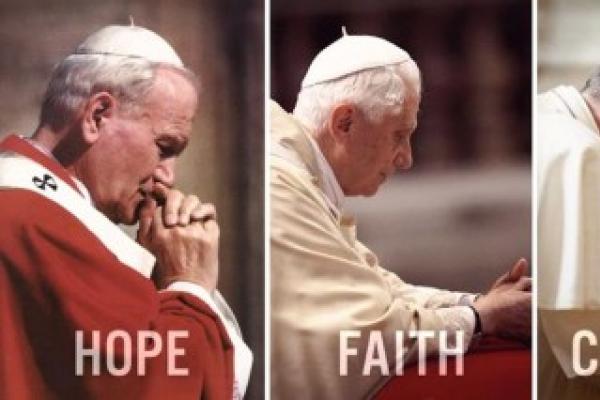If the range of possible Supreme Court rulings on gay marriage this month requires a scorecard, the potential confusion arising from those decisions may demand a manual.
It’s not as simple as whether gays and lesbians can marry, and whether they become eligible for federal benefits. The two decisions are likely to create new questions for couples in civil unions and those who move between states, as well as for employers.
As a result, what’s already a complex situation for many gay and lesbian couples could get more complicated, at least initially, said John Culhane, a law professor at Widener University’s Delaware campus and co-author of Same-Sex Legal Kit for Dummies.
As a millennia-old institution, the Vatican is accustomed to change at a glacial pace. But in the eyes of many outside the church — and even of some within it — the arrival of Pope Francis on the throne of St. Peter seems to have started nothing short of a revolution.
Even Francis himself, in his speech to Rome’s diocese on Monday, said that Christians not only can, but should, be “revolutionaries.”
Now, 100 days into his pontificate, a debate is brewing in Rome over whether Francis has set a distinctly different course from his predecessor, or whether the visible differences in style and personality between Francis and Benedict XVI mask a deeper theological and ideological continuity.
The Internet is abuzz with Miss Utah. Marissa Powell was asked at Sunday night’s Miss USA Pageant:
“A recent report shows that in 40 percent of American families with children, women are the primary earners, yet they continue to earn less than men. What does that say about society?”
Powell responded: “I think we can relate this back to education, and how we are continuing to try to strive … to … figure out how to create jobs right now. That is the biggest problem right now. I think, especially the men are … um … seen as the leaders of this, and so we need to see how to … create education better. So that we can solve this problem. Thank you.”
Her answer was painfully incoherent, and as you can tell in the video, the poor girl knew it. There’s a bit of irony in the question that has been missed. Maybe we should be asking, “What does it say about our society that we still have these kinds of beauty pageants?”
In an attempt to rebuild the image of the five gulf states — Alabama, Florida, Louisiana, Mississippi, and Texas, federal and state officials have joined forces on their journey to replenish the damage from 2010's BP oil-well tragedy. Talks of baseball stadiums, sea walls, and donations to the Gulf Coast Ecosystem Restoration Council are among the many entities who will benefit from President Obama’s Restore Act signed last year. The New York Times reports:
The money will mostly be split among the states and a new entity, the Gulf Coast Ecosystem Restoration Council, composed of state and federal officials. There are already plenty of ideas among the states for spending the cash, including constructing a sea wall around the city jail in Mobile, Ala., and deepening shipping channels. Biloxi, Miss., is using money already given to the state by BP to build a baseball stadium.
Here’s another idea: the states and the council should require that a nickel of every dollar they control be used to buy and protect coastal marshes and wetlands. It is the most important thing they can do to help the gulf survive the next oil spill.
Read more here.
It's no secret that most of us find ourselves longing for chances to vacate our normal scenery and the bustle of our everyday activities. It is, of course, a luxury and blessing of the modern world — and definitely of our country — that many of us have expendable income and time, but the ability and desire to take a break is something most of us would say that we need on occasion.
I think there is a biblical tie-in here as well. One of the spiritual revelations during my seminary years was one professor's focus on the “eighth day.” You are familiar, I am sure with Genesis' seven-day creation narrative. God created the heavens, the earth, animals, and mankind in six days. Then on the seventh day, God rested. This Divine day of rest then became the basis for God's gift of the Sabbath. It was a law (or was it Gospel?) given to God’s people in the book of Exodus, commanding that they break from work on the seventh day of the week — traditionally Saturday for the Jewish people. This day of rest was given so the people could find peace in not working, but also peace in God's presence. For the Jewish nation just released from slavery in Egypt, this day revealed a stark contrast from their lives as slaves — they now lived their lives as a chosen people of God.
This Sabbath tradition continued through the Old Testament and was even adopted by other cultures. But in spite of this gift, God's people never found true peace. Trouble continued, wars waged, life was still not perfect. Then, in the New Testament something happens. The Gospels each build up to, and point us toward, the cross. We see the seven-day passion narrative unfold beginning with the triumphal entry, climaxing in the cross, and then, following the historic tradition, Saturday becoming a day of rest as Christ is in the tomb.
But something changes.
Voters in Arizona celebrated yesterday after the Supreme Court dismissed parts of Proposition 200 — the requirement that made people of Arizona provide proof of citizenship when registering to vote. Although parts of Prop 200 remain intact, yesterday’s ruling was considered a step in the right direction for voters and immigrants across our nation. The Nation reports:
The Supreme Court defended voting rights yesterday when it struck down Arizona’s requirement to present proof of citizenship when registering to vote. But while the decision relieves registrants of an unnecessary burden, the rest of the proposition that brought it into being remains intact. Arizona’s Proposition 200 attacks not only voters but immigrants as well. Despite a win for voting rights yesterday, undocumented immigrants will remain especially vulnerable under the law.
Read more here.
Vampire Weekend are a little like a college-educated version of the rich young ruler in Mark 10. I say a little because, despite the fact that they have gotten flack for being “privileged, boat shoe and cardigan loving Ivy League graduates,” the New York-based foursome actually probably aren’t as wealthy as skeptics think, and the late 20-somethings probably haven’t been as straight edged as the rich young ruler. I mean, they’re rock stars. And even though they went to Columbia University, rock stars aren’t widely renowned for their moral rigidity.
But on Vampire Weekend’s third album, Modern Vampires of the City, which was released last month to critical acclaim and commercial success, we find lead singer Ezra Koenig asking honest questions of God, much like the young ruler.
On this album, the third in what Koenig sees as a trilogy, Vampire Weekend manage to mature their poppy, eclectic sound, drawing from all sorts of genres and international songs — as they normally do — but also exploring deep questions of morality, love, faith, and belief in complex ways.




